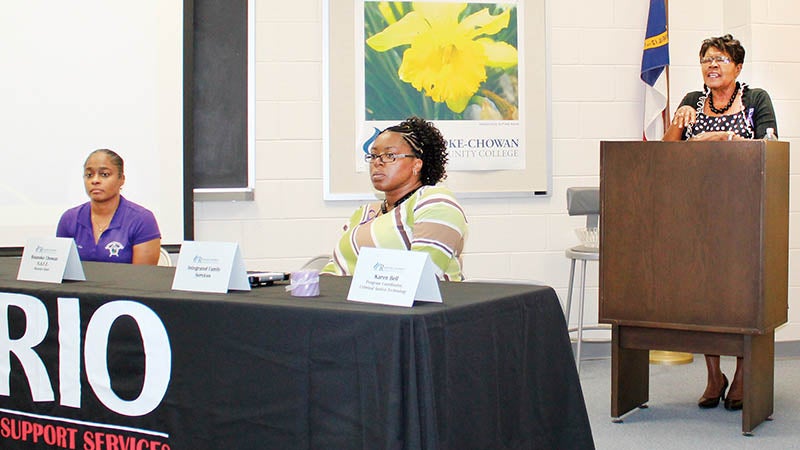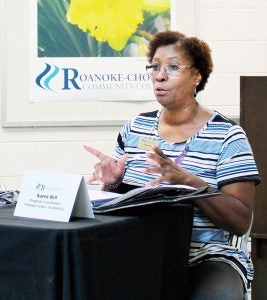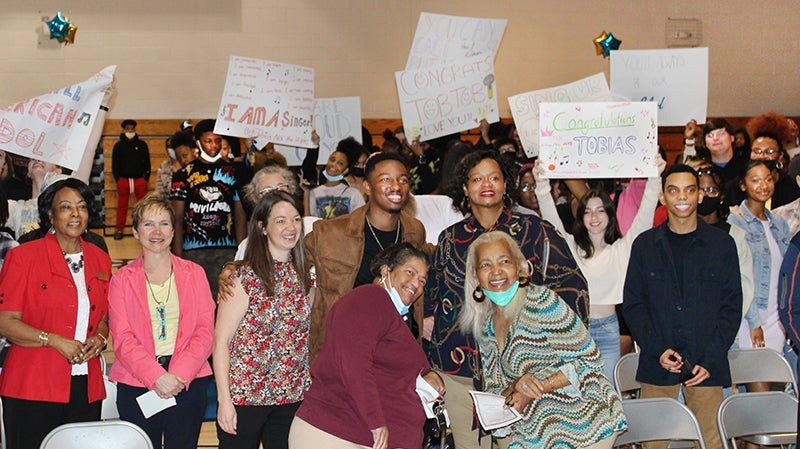The Quiet Epidemic
Published 11:28 am Monday, October 16, 2017

- Blannie Hunt (at podium), the Community Outreach Coordinator for Roanoke Chowan S.A.F.E., was joined by RCCC campus safety officer Tamara Allen (seated left) and Sharonda Brown of Integrated Family Services at Tuesday’s Domestic Violence Awareness Month seminar held at the community college. | Staff Photos by Holly Taylor
AHOSKIE – October is Domestic Violence Awareness Month. In an effort to combat all kinds of abuse within the family, Roanoke Chowan Community College’s Student Support Services partnered with both Roanoke Chowan S.A.F.E. and Integrated Family Services to host a seminar on awareness and prevention here at the community college campus Tuesday morning.
The hour-long seminar invited students and staff to learn more about the issue as well as provide an open forum for discussion.
Blannie Hunt, the Community Outreach Coordinator for Roanoke Chowan S.A.F.E. (Services for Abused Families with Emergencies), opened up the session with an overview of domestic violence and what resources are available to those who need help.
“We want to educate men, and we also want to educate women about domestic violence,” Hunt said. “Whether you’re a guy or a woman, there is help out there for both of you.”
Hunt touched on points about how anyone—no matter gender, color, socio-economic status—can be a victim, and how education is important because some people can grow up not knowing what they’re doing is wrong.

Karen Bell, Program Coordinator for RCCC’s Criminal Justice Technology department, delivers a point at the seminar.
She also explained briefly about the shelter that S.A.F.E. provides for women victims, as well as what the program does to help male victims too.
She also shared a bit of her own personal testimony of suffering domestic abuse in the past and eventually being able to escape from it.
“I decided to make a better life for me and my two children,” she explained.
Hunt also shared a short video which explained in more detail how domestic abuse can come in different forms, such as physical, mental, sexual, and financial. The video contained interviews with victims and several victim advocates, all of which had important stories and information to share.
There were powerful statements made during the video like “love is not supposed to hurt,” “relationships are a partnership, not ownership,” and most importantly: “it’s not your fault.”
After the video, other guest speakers shared their perspectives and opened up the forum for discussion with the people in attendance.
Sharonda Brown from Integrated Family Services spoke briefly about what the organization offered for people in domestic violence situations. They had information packets available for attendees who wanted to know more about what they could do to help.
RCCC campus safety officer Tamara Allen spoke next to offer a law enforcement perspective on the abuse many people face.
“Domestic violence, in many ways, is a quiet epidemic,” Allen said as she stepped up to the podium. “We never really hear about domestic violence until it’s a football player, basketball player, somebody that’s famous. Other than that, you wouldn’t hear it.”
She asked the audience what they considered to be domestic violence and at what point do things cross the line into abuse.
A variety of answers were heard, including “not being able to be yourself around your partner,” “controlling a person mentally and physically,” and “putting your hands on someone.” All of which demonstrated the different shapes abuse can take.
Allen emphasized the importance of discussion as often as possible, saying “The more we talk about things, the more we have different forums on domestic violence, the more we learn.”
She also stressed how important it is to be able to document any abuse that happens so that victims will be able to defend themselves legally.
During Allen’s presentation, many of the people in attendance shared personal stories and asked questions about how to address the issue despite its difficulties.
The last speaker was Karen Bell who serves as Program Coordinator for RCCC’s Criminal Justice Technology department. Bell provided a list of safety rules people should remember if they end up in a situation where they’re suffering from physical domestic violence.
These tips included points such as avoiding small areas and the kitchen during a fight, teach children to stay away from a fight for their own safety, tell people what’s happening, create a window of opportunity to escape, and have an emergency bag packed for yourself and your children.
Bell further explained that an emergency bag should contain items like important documents, medications, a change of clothes, spare keys, bus passes, and other similar things. A person in an abusive environment should leave the emergency bag with a trustworthy friend.
Other tips Bell had to share were simple suggestions like having a code word to alert friends that something is wrong, blinking porch lights to draw attention to the dangerous situation, or honking the horn if the abuser has the victim in a car.
“A lot of people stay because they feel like they can’t start over again. It’s harder to start over again and they don’t have the money to do this, and they don’t have the money to do that,” Bell explained. “But there’s a lot of resources out there that can help. And there’s nothing wrong with starting over again.”
The purpose of the seminar was to raise more awareness about the abuse anyone can face, and by the end of it, the attendees left armed with the knowledge of what they can do to help stop the violence.
Hunt perhaps summed it up best by saying “It’s never too late. Help is out there.”


